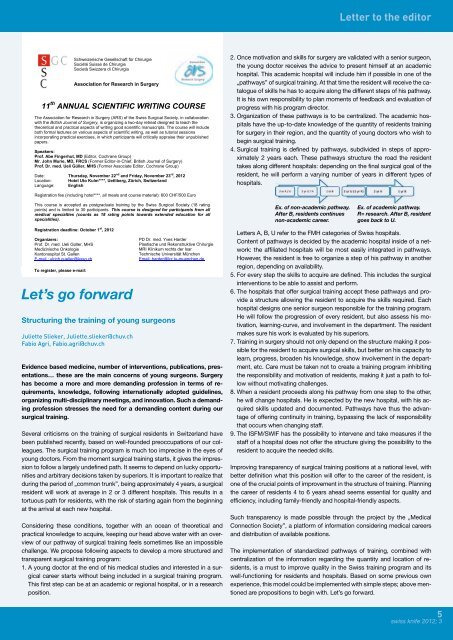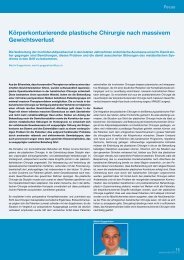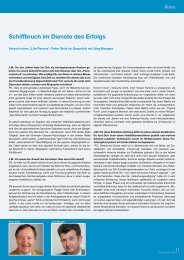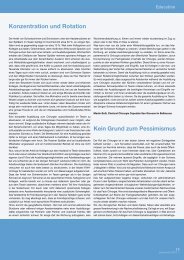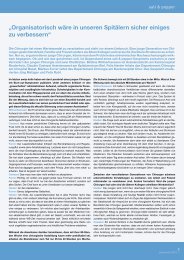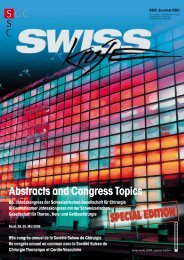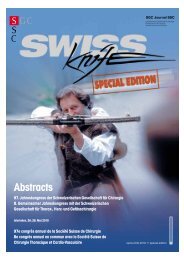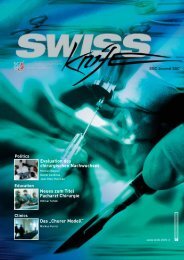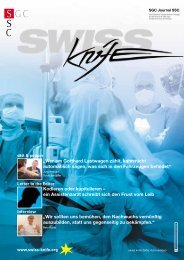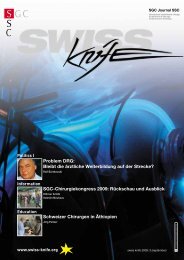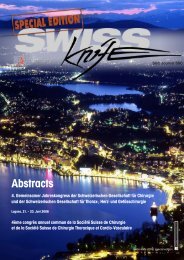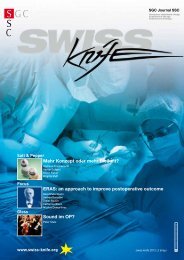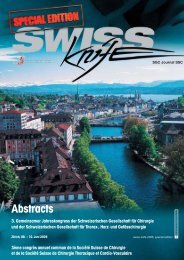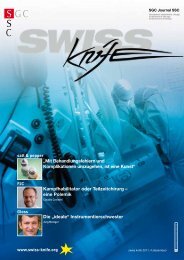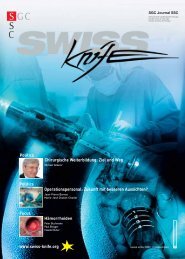Bücher: Des Chirurgen Top 10 „Die kommende Zeit ... - SWISS KNIFE
Bücher: Des Chirurgen Top 10 „Die kommende Zeit ... - SWISS KNIFE
Bücher: Des Chirurgen Top 10 „Die kommende Zeit ... - SWISS KNIFE
Erfolgreiche ePaper selbst erstellen
Machen Sie aus Ihren PDF Publikationen ein blätterbares Flipbook mit unserer einzigartigen Google optimierten e-Paper Software.
Association for Research in Surgery<br />
Schweizerische Gesellschaft für Chirurgie<br />
Société Suisse de Chirurgie<br />
Società Swizzera di Chirurgia<br />
Let’s go forward<br />
Structuring the training of young surgeons<br />
Juliette Slieker, Juliette.slieker@chuv.ch<br />
Fabio Agri, Fabio.agri@chuv.ch<br />
Evidence based medicine, number of interventions, publications, presentations…<br />
these are the main concerns of young surgeons. Surgery<br />
has become a more and more demanding profession in terms of requirements,<br />
knowledge, following internationally adopted guidelines,<br />
organizing multi-disciplinary meetings, and innovation. Such a demanding<br />
profession stresses the need for a demanding content during our<br />
surgical training.<br />
Several criticisms on the training of surgical residents in Switzerland have<br />
been published recently, based on well-founded preoccupations of our colleagues.<br />
The surgical training program is much too imprecise in the eyes of<br />
young doctors. From the moment surgical training starts, it gives the impression<br />
to follow a largely undefined path. It seems to depend on lucky opportunities<br />
and arbitrary decisions taken by superiors. It is important to realize that<br />
during the period of „common trunk”, being approximately 4 years, a surgical<br />
resident will work at average in 2 or 3 different hospitals. This results in a<br />
tortuous path for residents, with the risk of starting again from the beginning<br />
at the arrival at each new hospital.<br />
Considering these conditions, together with an ocean of theoretical and<br />
practical knowledge to acquire, keeping our head above water with an overview<br />
of our pathway of surgical training feels sometimes like an impossible<br />
challenge. We propose following aspects to develop a more structured and<br />
transparent surgical training program:<br />
1. A young doctor at the end of his medical studies and interested in a surgical<br />
career starts without being included in a surgical training program.<br />
This first step can be at an academic or regional hospital, or in a research<br />
position.<br />
Letter to the editor<br />
Association for Research in Surgery<br />
2. Once motivation and skills for surgery are validated with a senior surgeon,<br />
the young doctor receives the advice to present himself at an academic<br />
hospital. This academic hospital will include him if possible in one of the<br />
„pathways” of surgical training. At that time the resident will receive the catalogue<br />
of skills he has to acquire along the different steps of his pathway.<br />
It is his own responsibility to plan moments of feedback and evaluation of<br />
progress with his program director.<br />
3. Organization of these pathways is to be centralized. The academic hospitals<br />
have the up-to-date knowledge of the quantity of residents training<br />
for surgery in their region, and the quantity of young doctors who wish to<br />
begin surgical training.<br />
4. Surgical training is defined by pathways, subdivided in steps of approximately<br />
2 years each. These pathways structure the road the resident<br />
takes along different hospitals: depending on the final surgical goal of the<br />
resident, he will perform a varying number of years in different types of<br />
hospitals.<br />
Association for Research in Surgery<br />
11 th ANNUAL SCIENTIFIC WRITING COURSE<br />
The Association for Research in Surgery (ARS) of the Swiss Surgical Society, in collaboration<br />
with the British Journal of Surgery, is organizing a two-day retreat designed to teach the<br />
theoretical and practical aspects of writing good scientific manuscripts. The course will include<br />
both formal lectures on various aspects of scientific writing, as well as tutorial sessions<br />
incorporating practical exercises, in which participants will critically appraise their unpublished<br />
papers.<br />
Speakers:<br />
Prof. Abe Fingerhut, MD (Editor, Cochrane Group)<br />
Mr. John Murie, MD, FRCS (Former Editor-in-Chief, British Journal of Surgery)<br />
Prof. Dr. med. Ueli Güller, MHS (Former Associate Editor, Cochrane Group)<br />
Date: Thursday, November 22 nd and Friday, November 23 rd , 2012<br />
Location: Hotel Uto Kulm****, Uetliberg, Zürich, Switzerland<br />
Language: English<br />
Registration fee (including hotel****, all meals and course material): 600 CHF/500 Euro<br />
This course is accepted as postgraduate training by the Swiss Surgical Society (18 rating<br />
points) and is limited to 30 participants. This course is designed for participants from all<br />
medical specialties (counts as 18 rating points towards extended education for all<br />
specialities).<br />
Registration deadline: October 1 st The Association for Research in Surgery (ARS) of the Swiss Surgical Society, in collaboration<br />
with the British Journal of Surgery, is organizing a two-day retreat designed to teach the<br />
theoretical and practical aspects of writing good scientific manuscripts. The course will include<br />
both formal lectures on various aspects of scientific writing, as well as tutorial sessions<br />
incorporating practical exercises, in which participants will critically appraise their unpublished<br />
papers.<br />
Speakers:<br />
Prof. Abe Fingerhut, MD (Editor, Cochrane Group)<br />
Mr. John Murie, MD, FRCS (Former Editor-in-Chief, British Journal of Surgery)<br />
Prof. Dr. med. Ueli Güller, MHS (Former Associate Editor, Cochrane Group)<br />
Date: Thursday, November 22<br />
, 2012<br />
Organizers:<br />
Prof. Dr. med. Ueli Güller, MHS<br />
Medizinische Onkologie<br />
Kantonsspital St. Gallen<br />
E-mail : ulrich.gueller@kssg.ch<br />
nd and Friday, November 23 rd , 2012<br />
Location: Hotel Uto Kulm****, Uetliberg, Zürich, Switzerland<br />
Language: English<br />
Registration fee (including hotel****, all meals and course material): 600 CHF/500 Euro<br />
This course is accepted as postgraduate training by the Swiss Surgical Society (18 rating<br />
points) and is limited to 30 participants. This course is designed for participants from all<br />
medical specialties (counts as 18 rating points towards extended education for all<br />
specialities).<br />
Registration deadline: October 1 st The Association for Research in Surgery (ARS) of the Swiss Surgical Society, in collaboration<br />
with the British Journal of Surgery, is organizing a two-day retreat designed to teach the<br />
theoretical and practical aspects of writing good scientific manuscripts. The course will include<br />
both formal lectures on various aspects of scientific writing, as well as tutorial sessions<br />
incorporating practical exercises, in which participants will critically appraise their unpublished<br />
papers.<br />
Speakers:<br />
Prof. Abe Fingerhut, MD (Editor, Cochrane Group)<br />
Mr. John Murie, MD, FRCS (Former Editor-in-Chief, British Journal of Surgery)<br />
Prof. Dr. med. Ueli Güller, MHS (Former Associate Editor, Cochrane Group)<br />
Date: Thursday, November 22<br />
, 2012<br />
Organizers:<br />
Prof. Dr. med. Ueli Güller, MHS<br />
Medizinische Onkologie<br />
Kantonsspital St. Gallen<br />
E-mail : ulrich.gueller@kssg.ch<br />
PD Dr. med. Yves Harder<br />
Plastische und Rekonstruktive Chirurgie<br />
MRI Klinikum rechts der Isar<br />
Technische Universität München<br />
Email: harder@lrz.tu-muenchen.de<br />
nd and Friday, November 23 rd , 2012<br />
Location: Hotel Uto Kulm****, Uetliberg, Zürich, Switzerland<br />
Language: English<br />
Registration fee (including hotel****, all meals and course material): 600 CHF/500 Euro<br />
This course is accepted as postgraduate training by the Swiss Surgical Society (18 rating<br />
points) and is limited to 30 participants. This course is designed for participants from all<br />
medical specialties (counts as 18 rating points towards extended education for all<br />
specialities).<br />
Registration deadline: October 1 st , 2012<br />
Organizers:<br />
Prof. Dr. med. Ueli Güller, MHS<br />
Medizinische Onkologie<br />
Kantonsspital St. Gallen<br />
E-mail : ulrich.gueller@kssg.ch<br />
PD Dr. med. Yves Harder<br />
Plastische und Rekonstruktive Chirurgie<br />
MRI Klinikum rechts der Isar<br />
Technische Universität München<br />
Email: harder@lrz.tu-muenchen.de<br />
To<br />
PD<br />
register,<br />
Dr. med.<br />
please<br />
Yves Harder<br />
e-mail:<br />
Plastische und Rekonstruktive Chirurgie<br />
scientificwritingcourse@gmail.com<br />
MRI Klinikum rechts der Isar<br />
Technische Universität München<br />
Email: harder@lrz.tu-muenchen.de<br />
To register, please e-mail:<br />
scientificwritingcourse@gmail.com<br />
Schweizerische Gesellschaft für Chirurgie<br />
Société Suisse de Chirurgie<br />
Società Swizzera di Chirurgia<br />
Schweizerische Gesellschaft für Chirurgie<br />
Société Suisse de Chirurgie<br />
Società Swizzera di Chirurgia<br />
11 th 11 ANNUAL SCIENTIFIC WRITING COURSE<br />
th ANNUAL SCIENTIFIC WRITING COURSE<br />
To register, please e-mail:<br />
scientificwritingcourse@gmail.com<br />
Ex. of non-academic pathway. Ex. of academic pathway.<br />
After B, residents continues R= research. After B, resident<br />
non-academic career. goes back to U.<br />
Letters A, B, U refer to the FMH categories of Swiss hospitals.<br />
Content of pathways is decided by the academic hospital inside of a network:<br />
the affiliated hospitals will be most easily integrated in pathways.<br />
However, the resident is free to organize a step of his pathway in another<br />
region, depending on availability.<br />
5. For every step the skills to acquire are defined. This includes the surgical<br />
interventions to be able to assist and perform.<br />
6. The hospitals that offer surgical training accept these pathways and provide<br />
a structure allowing the resident to acquire the skills required. Each<br />
hospital designs one senior surgeon responsible for the training program.<br />
He will follow the progression of every resident, but also assess his motivation,<br />
learning-curve, and involvement in the department. The resident<br />
makes sure his work is evaluated by his superiors.<br />
7. Training in surgery should not only depend on the structure making it possible<br />
for the resident to acquire surgical skills, but better on his capacity to<br />
learn, progress, broaden his knowledge, show involvement in the department,<br />
etc. Care must be taken not to create a training program inhibiting<br />
the responsibility and motivation of residents, making it just a path to follow<br />
without motivating challenges.<br />
8. When a resident proceeds along his pathway from one step to the other,<br />
he will change hospitals. He is expected by the new hospital, with his acquired<br />
skills updated and documented. Pathways have thus the advantage<br />
of offering continuity in training, bypassing the lack of responsibility<br />
that occurs when changing staff.<br />
9. The ISFM/SWIF has the possibility to intervene and take measures if the<br />
staff of a hospital does not offer the structure giving the possibility to the<br />
resident to acquire the needed skills.<br />
Improving transparency of surgical training positions at a national level, with<br />
better definition what this position will offer to the career of the resident, is<br />
one of the crucial points of improvement in the structure of training. Planning<br />
the career of residents 4 to 6 years ahead seems essential for quality and<br />
efficiency, including family-friendly and hospital-friendly aspects.<br />
Such transparency is made possible through the project by the „Medical<br />
Connection Society”, a platform of information considering medical careers<br />
and distribution of available positions.<br />
The implementation of standardized pathways of training, combined with<br />
centralization of the information regarding the quantity and location of residents,<br />
is a must to improve quality in the Swiss training program and its<br />
well-functioning for residents and hospitals. Based on some previous own<br />
experience, this model could be implemented with simple steps; above mentioned<br />
are propositions to begin with. Let’s go forward.<br />
5<br />
swiss knife 2012; 3


